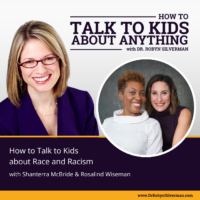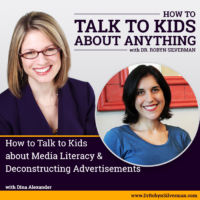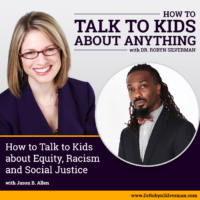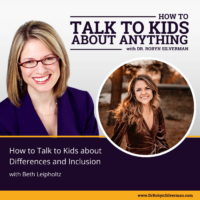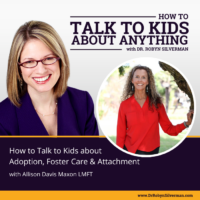Podcast: Play in new window | Download
Subscribe: Apple Podcasts | RSS | More
How to Talk to Kids about the Connection between Kindness and Wellness
Synopsis: Is there really a connection between how we treat others, how others treat us…and health? As it turns out, there is—and it’s shown in scientific studies. Human compassion, connection and kindness can make us all feel healthier—and BE healthier. What are some ways we can change our environment and interactions so that we all become healthier in the long run? We must infuse more kindness—and look into how we are being treated in our day to day lives.
Special guest: Kelli Harding, MD
We all hear medical stories of triumph and frustration—there are so many mysteries when it comes to health- why 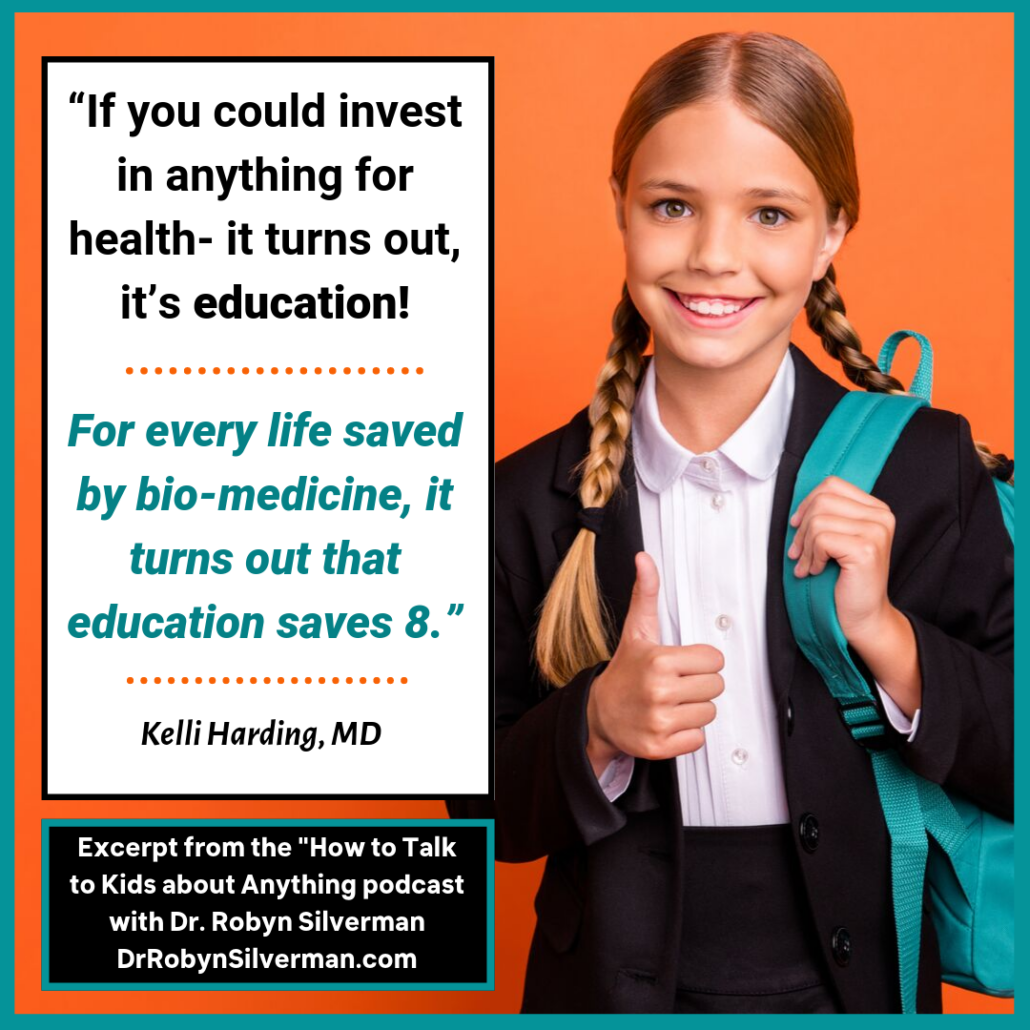 some people, who are biologically healthy, but feel ill—and some patients who are biologically ill, but feel healthy. Doctors have racked their brains for years- looking for patterns, problems, links that somehow explain why certain people get better quickly and others get sick quickly and don’t recover. And perhaps it might surprise you, as you will hear in the next interview—that how we feel is not necessarily about the dosage of medication or the brilliance of the doctor but about something simpler- something much more common and humane but something that isn’t always provided—and it comes down to the science of kindness, connection and human compassion. When we look at our children- and notice that some thrive and some continue to falter, it will be interesting to look through the lens of kindness, compassion and connection to see if this is any area that needs to be bolstered in the lives of the kids we know and love. The lives that are often stressed with go, go, go hours being shuttled from sports practices to music practice to hours of homework, where they spend a great deal of time in school where many might not feel seen and heard, where social media can make us feel more disconnected, envious and perfectionistic than ever– How could some shifts of the heart, in the time we spend, with who we spend it with– make the difference in the wellness of our children and ourselves? For that, we turn to Dr. Kelli Harding.
some people, who are biologically healthy, but feel ill—and some patients who are biologically ill, but feel healthy. Doctors have racked their brains for years- looking for patterns, problems, links that somehow explain why certain people get better quickly and others get sick quickly and don’t recover. And perhaps it might surprise you, as you will hear in the next interview—that how we feel is not necessarily about the dosage of medication or the brilliance of the doctor but about something simpler- something much more common and humane but something that isn’t always provided—and it comes down to the science of kindness, connection and human compassion. When we look at our children- and notice that some thrive and some continue to falter, it will be interesting to look through the lens of kindness, compassion and connection to see if this is any area that needs to be bolstered in the lives of the kids we know and love. The lives that are often stressed with go, go, go hours being shuttled from sports practices to music practice to hours of homework, where they spend a great deal of time in school where many might not feel seen and heard, where social media can make us feel more disconnected, envious and perfectionistic than ever– How could some shifts of the heart, in the time we spend, with who we spend it with– make the difference in the wellness of our children and ourselves? For that, we turn to Dr. Kelli Harding.
Dr. Kelli Harding is an assistant clinical professor of psychiatry at Columbia University Irving Medical Center. She is a diplomat of the American Board of Psychiatry and Neurology, as well as boarded in the specialty of psychosomatic (mind-body) medicine. Kelli has spent much of her career in the emergency room at New York-Presbyterian Hospital, and has appeared on Today, Good Morning America, NPR, The New York Times, Medscape, Oprah.com, and US News & World Report. Kelli resides in NYC with her family. She also has a new book that just came out called The Rabbit Effect: Live Longer, Happier and Healthier with Groundbreaking Science of Kindness
This podcast provides:
- The hidden factors affecting people’s health
- The importance of kind touch on health and wellness
- What the loneliness loop is and how we can all feel more connected
- What is the impact of environment and sense of purpose on health and wellness
- How trauma affects health and wellness
- How we can help those with trauma or help ourselves who had trauma move forward
- How to talk to kids about the changes that need to be made
- What we really need to know about kindness and wellness
Important Messages:
- While good medical care is absolutely critical, it probably only accounts for about 10-20% of our overall health.
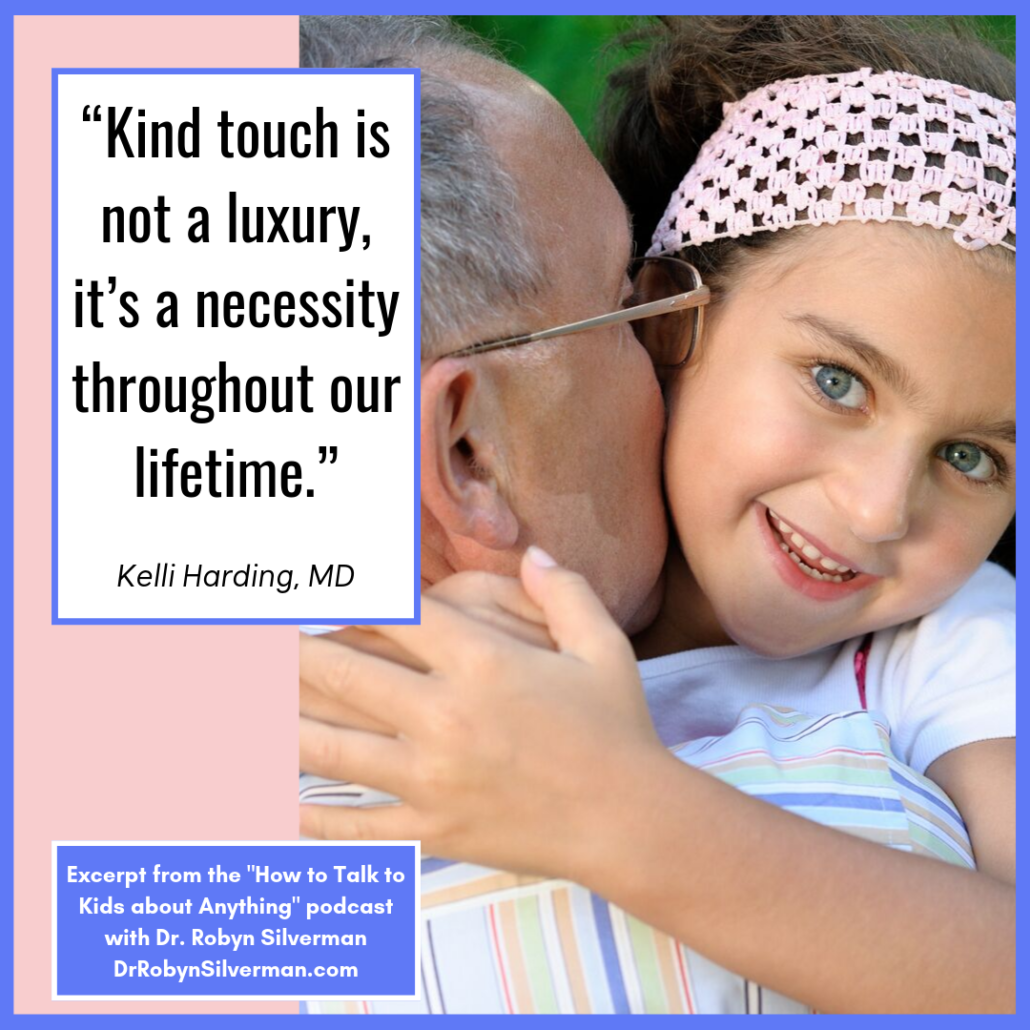 Genes play a role- and are much more valuable than we originally appreciated. Other than that- it’s the environment that we are in- our homes, schools, work places- how we are treated in theses areas of our lives.
Genes play a role- and are much more valuable than we originally appreciated. Other than that- it’s the environment that we are in- our homes, schools, work places- how we are treated in theses areas of our lives. - Rabbit study: late 1970s- connection between diet and heart-health. High fat diet in rabbits. But one group had 50% better outcomes. Why? Under the care of one researcher- kind researcher, petting, talking to them, giving them love and kindness. Published in “Science” journal.
- Touch- warm, loving touch get under our skin in a positive way. Science- epigenetics- how the DNA folds and gets expressed. Rat studies. Mother rat licking her young changes biology. Missing link between mind and body. We feel better- supportive hand- not just make a difference in how you feel but also on a biological level.
- Practice hugs: 6-20 seconds
- Pop on a movie and snuggle in if hugs are diminished as kids are older. Try to do it as you walk out the door in the morning to set them up for a great day.
- Challenge: Try a 20 second hug!
- When someone gives kindness to you, you are more likely to pass it on. Implement more!
- Takeaway: Prioritize connection time. Rethink technology- as you can’t connect face to face if your face is in a phone!
- Kids 10 and under don’t know a time without phones. Curtail it.
- Loneliness loop- feeling chronically lonely can greatly impact health- like smoking 15 cigarettes a day. (1) Loneliness when we don’t have the people around us that we need (2) Lonely in a crowded room- not clicking.
- Lots of great things about technology but also some disadvantages.
- Connect with the people around you- the people at the coffee shop, the library- make your world more connected. Loose social skills also have a tie to health- do what you can!
- Do good- little moments to extend kindness can affect both you and the other person. Volunteering is amazing for your health. Benefits everyone. Show up. Win win.
- Nature, know your neighbors, plant/flower on desk—makes you kinder, give a plant to a friend.
- Evidence- having trees on your street lowers rates of depression. Going to a park helps. Planting flowers. Community spaces. If you landscape vacant lots- reduces gun violence and boosts property values. Win win. Community gardens- kids more likely to eat veggies that they help to grow. Studies- boosts your natural killer cells.
- Feeling lonely? Do a gesture of kindness.
- Trauma- when people experience trauma, especially as a kid, it impacts health.
- ACES: Online check lists- what went on as a child and how it impacts them as adults. Every other person on the street has some kind of trauma- but we don’t talk about it!
- Maladaptive behavior- coming from a place of hurt. The way we treat pain- proscribe pill instead of talking about it.
- Don’t forget to be kind to yourself.
- 15 minutes- writing about gratitude and kindness for 3 days straight can change perspective. We can’t change the past- but we can recognize that we’ve grown from it.
- Trauma informed yoga. Lots of strategies. Therapy. Massage. We hold a lot of trauma in our bodies. Massage can be a wonderful release.
- If you could invest in anything that is helpful to our health—it’s education!
- Heart connection- connects you with purpose.
- Good grades are ice- but creating curiosity is really the important thing that gets people up and out in the morning.
- “For every life saved by bio-medicine, it turns out that education saves 8.” We spend so much on healthcare and invest so little in education! Helps on practical level but also it can impact telomere length—helps us live longer!
- Harshness doesn’t make people feel motivated to perform.
- Make sure you are apologizing as well as helping all family members to see that nobody is perfect and everyone makes mistakes.
- Be gentle with yourself and others.
- Have to think about how we are treating other in society- tipping point- seeing population studies- we aren’t on same graph as other wealthy nations. Not prioritizing how we treat one another. We are doing poorly in comparison to other nations.
- What about empathy? Flip the lens! (Listen to Michele Borba’s episode!)
- We’ve all had people who are kind in our lives- reach out to them- send them a note or reach out to them! We don’t always know how our kindness is impacting others. Take time to do that.
- Look at conflict resolution- most important life skill that we don’t learn in formal education. Focusing on the problem not the people. See Coleman McCarthy (Washington Post).
- Reconnect with others who have made a difference.
Notable Quotables:
- “While good medical care is absolutely critical, it probably only accounts for about 10-20% of our overall health. What’s the other 80%? Genes play a role but other than that, it’s how we are being treated in our day to day lives—our homes, schools, work places, neighborhoods and our broader communities. We, in America, we tend to think of “healthcare” as health—it goes well beyond that.”
- “There are decades of data that show that our social work is impacting our health in many different ways.”
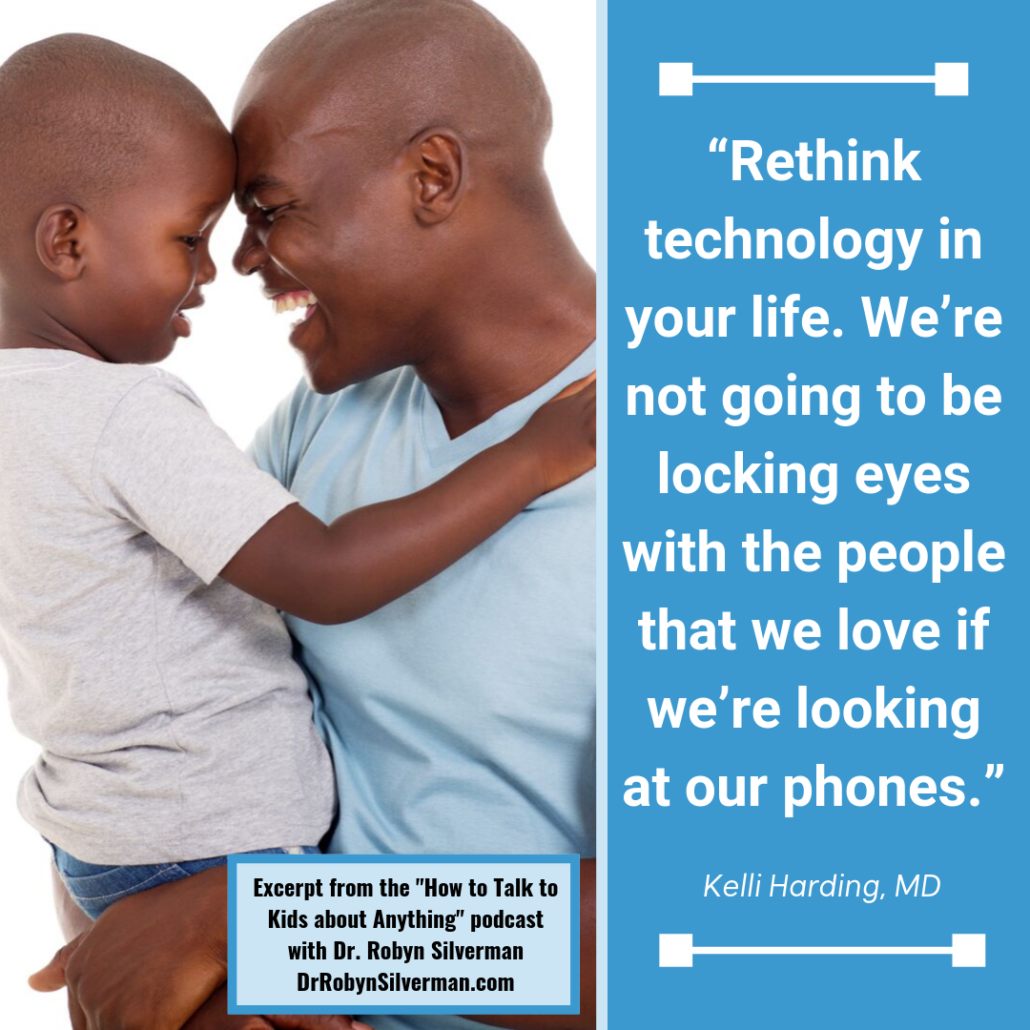
- “Warm, loving touch gets under our skin in a positive way.”
- “When someone’s kind to you, you are more likely to pass it on to someone else.”
- “Prioritize connection time.”
- “Rethink technology in your life. We’re not going to be locking eyes with the people that we love if we’re looking at our phones.”
- “For years, loneliness has been underappreciated as a health risk. Now finally getting it’s due. Feeling chronically lonely is as significant a risk to health as smoking 15 cigarettes a day, drinking heavy alcohol or high blood pressure. We talk about going to the doctor when we’re not feeling well but we don’t often talk about if we have someone we feel close enough to call when things aren’t going well. This is as important as going to the gym and getting a good night’s sleep– those things matter but it also matters that we are connected to the people around us.”
- “Feeling lonely? Do a gesture of kindness.”
- “When we take care of ourselves, we show our kids that that’s what we do. That’s part of being kind.”
- “It’s often easier to be kinder to others than we are to ourselves but I think the more we practice being kind to others the better we get at being kind to ourselves.”
- “When it comes to trauma, we know we can’t change the past but we can recognize that we have grown from it to some extend.”
- “Kind touch is not a luxury, it’s a necessity throughout our lifetime.”
- “If you could invest in anything for health- it turns out, it’s education! We want to create life-long learners. When we do, that’s where the maximum health benefits happen.”
- “Good grades are nice but it’s really about creating purpose and curiosity that gets people up and out the door in the morning to go and do something that they feel inspired about.”
- “For every life saved by bio-medicine, it turns out that education saves 8.”
- “Be gentle. Shift from asking; ‘what’s wrong with you?’ to ‘what happened to you?’” You don’t know what people are struggling with.”
- “I think we’re at a tipping point where we really need to think about how we are treating others in society because it’s impacting our health.”


